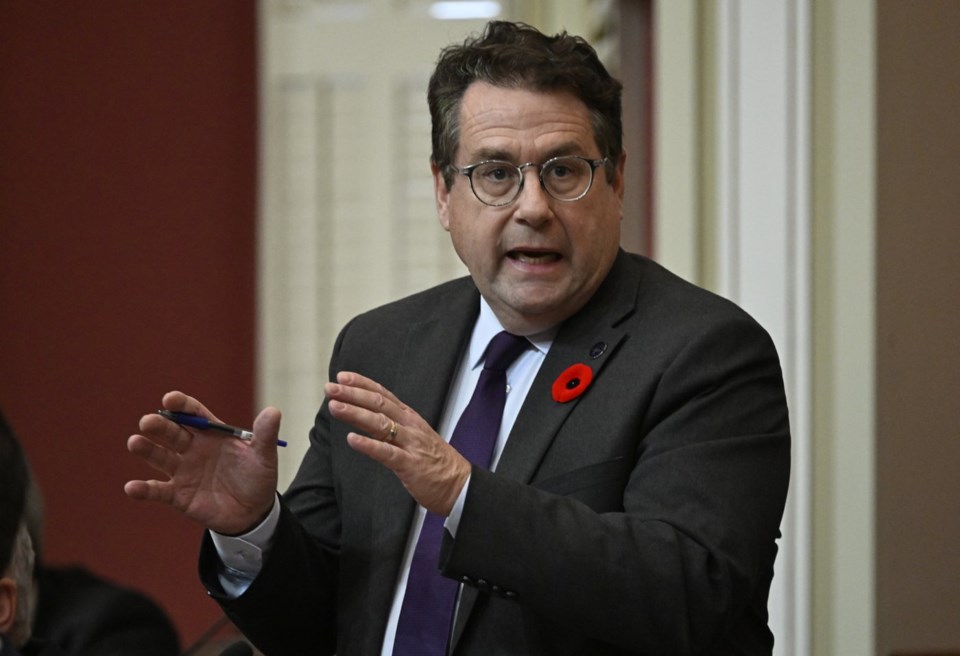MONTREAL ŌĆö Quebec's auditor general says the province's Education Department has done little in the past two decades to help Indigenous students in Quebec, whose graduation rates lag behind those of Indigenous students in other provinces.
In her report published Wednesday, Guylaine Leclerc said the Quebec government knew about a major gap in success rates between Indigenous and non-Indigenous students since at least 2005, but failed to provide the necessary funding and planning to narrow that divide.
ŌĆ£Nearly 20 years after noting a success gap among Indigenous students, the Education Department is still taking little action to promote their success," the report said.
It references 2021 data from Statistics Canada that says the proportion of QuebecŌĆÖs Indigenous population between 25 and 34 years old without degrees or certificates was 31.4 per cent ŌĆö two-thirds higher than the provinceŌĆÖs non-Indigenous population at 9.3 per cent.
QuebecŌĆÖs Indigenous graduation rates also lag behind nationally. The number of Indigenous people in Quebec aged 25-34 without a diploma or certificate is 10 per cent higher than the average of CanadaŌĆÖs other provinces.
When Indigenous students, many of whom don't speak French fluently, transfer from schools in their communities into the province's education system, they are given insufficient support, such as language training, the report said.
The language barrier undermines their ability to succeed, Leclerc said in the report, adding that funding for Indigenous student language support is "minuscule" compared to what immigrant students in the province receive. In the 2022-23 academic year, 10 per cent of Indigenous students in French schools received language support, compared to 46 per cent of immigrant students, the report said.
The province must do more to build trust between schools and Indigenous communities, Leclerc said. "The majority of the staff we met who worked with Indigenous students had not received training on the realities of Indigenous students."
Speaking to reporters at a news conference Wednesday, Leclerc said school staff may have good intentions but lack the knowledge to respond to Indigenous students' needs in ways that resonate on a cultural level.
ŌĆ£Those professionals who work in those schools ŌĆ” don't have the tools to work with those students. They don't have sufficient training to work with those children,ŌĆØ Leclerc said at the Quebec legislature.
Liaison agents are one important resource in short supply, she said, adding that they act as a bridge between the school and Indigenous families, helping students integrate more easily in school.
Although the Education Department began increasing funding for Indigenous students in 2005, the money wasn't distributed evenly. The report said schools submit funding requests for Indigenous students' education based on a number of factors, including students' spoken language and family income. But it said the government doesn't take that data into account when it distributes money, which is non-recurring, hindering the ability of schools to implement long-term measures.
Leclerc's recommendations include that Quebec education officials define and implement indicators to improve Indigenous students' success rates; train school staff on Indigenous realities; and develop culturally relevant learning environments.
ŌĆ£WeŌĆÖre not surprised,ŌĆØ said Denis Gros-Louis, director general of the First Nations Education Council, which represents 25 schools in Indigenous communities in Quebec. None of the 25 schools are overseen by the provinceŌĆÖs Education Department.
ŌĆ£This report, however, I hope will be a spark for the ministryŌĆÖs staff and the minister himself to address the systemic barriers that have been built over the years,ŌĆØ he said, adding that there is a ŌĆ£disconnectŌĆØ between the provinceŌĆÖs Education Department and the reality of Indigenous students.
Gros-Louis said that some measures could be implemented at no cost, like including knowledge of Quebec First Nations in teacher training programs.
Neither the Quebec Education Department nor the Quebec minister responsible for First Nations and Inuit relations responded to requests for comment on Thursday.
This report by The 91įŁ┤┤ Press was first published Nov. 21, 2024.
Joe Bongiorno, The 91įŁ┤┤ Press



